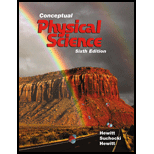
Conceptual Physical Science (6th Edition)
6th Edition
ISBN: 9780134060491
Author: Paul G. Hewitt, John A. Suchocki, Leslie A. Hewitt
Publisher: PEARSON
expand_more
expand_more
format_list_bulleted
Textbook Question
Chapter 26, Problem 84E
Astronomer using land-based telescopes must contend with glare from moonlight for about two weeks out of every month. Is the same true of an astronomer using an orbiting space telescope?
Expert Solution & Answer
Want to see the full answer?
Check out a sample textbook solution
Students have asked these similar questions
No chatgpt pls will upvote
No chatgpt pls will upvote
No chatgpt pls will upvote
Chapter 26 Solutions
Conceptual Physical Science (6th Edition)
Ch. 26 - How many known planets are in our solar system?Ch. 26 - What dwarf planet was downgraded from planetary...Ch. 26 - How are the outer planets different from the inner...Ch. 26 - Why does a nebula spin faster as it contracts?Ch. 26 - According to the nebular theory, did the planets...Ch. 26 - Prob. 6RCQCh. 26 - What are sunspots?Ch. 26 - What is the solar wind?Ch. 26 - How does the rotation of the Sun differ from the...Ch. 26 - Prob. 10RCQ
Ch. 26 - Why are the days on Mercury very hot and the...Ch. 26 - What two planets are evening or morning stars?Ch. 26 - Why is Earth called the blue planet?Ch. 26 - What gas makes up most of the Martian atmosphere?Ch. 26 - What evidence tells us that Mars was at one time...Ch. 26 - What surface feature do Jupiter and the Sun have...Ch. 26 - Which move faster: Saturns inner rings or the...Ch. 26 - How tilted is Uranuss axis?Ch. 26 - Why is Nepcune bluer than Uranus?Ch. 26 - Why doesnt the Moon have an atmosphere?Ch. 26 - Where is the Sun located when you view a fall...Ch. 26 - Where are the Sun and the Moon located at the time...Ch. 26 - Why dont eclipses occur monthly, or nearly...Ch. 26 - How does the Moons rate of rotation about its own...Ch. 26 - Between the orbits of what two planets is the...Ch. 26 - What is the difference between a meteor and a...Ch. 26 - What is the Kuiper belt?Ch. 26 - What is the Oort cloud, and what is it noted for?Ch. 26 - Prob. 29RCQCh. 26 - What causes comet tails to point away from the...Ch. 26 - Knowing that the speed of light is 300,000 km/s,...Ch. 26 - How many days does sunlight take to travel the...Ch. 26 - The light-year is a standard unit of distance used...Ch. 26 - The nearest star to our Sun is Alpha Centauri,...Ch. 26 - If the Sun were the size of a beach ball, Earth...Ch. 26 - Rank these planets in order from longest to...Ch. 26 - Rank these planets in order of increasing number...Ch. 26 - Rank in order of increasing average density: (a)...Ch. 26 - Rank in order of increasing pressure at the center...Ch. 26 - Rank in order of decreasing number of people who...Ch. 26 - Rank in order of increasing average distance from...Ch. 26 - According to the nebular theory, what happens to a...Ch. 26 - Prob. 49ECh. 26 - When a contracting ball of hot gas spins into a...Ch. 26 - If Earth didnt spin on its axis but still revolved...Ch. 26 - If Earth didnt spin on its axis but still revolved...Ch. 26 - Which tends to be larger: a star or a nebula?...Ch. 26 - Prob. 54ECh. 26 - Prob. 55ECh. 26 - Prob. 56ECh. 26 - Explain why the radiation zone is more dense than...Ch. 26 - Explain how energy is transported from the Sun's...Ch. 26 - Explain how energy is transported outward through...Ch. 26 - The greenhouse effect is very pronounced on Venus...Ch. 26 - What is the cause of winds on Mars (and also on...Ch. 26 - Why is there so little wind on the surface of...Ch. 26 - If Venus were somehow transported into the...Ch. 26 - Mercury and Venus are never seen at night straight...Ch. 26 - As evidenced in the photos that make up Figure...Ch. 26 - What is the major difference between the...Ch. 26 - What does Jupiter have in common with the Sun that...Ch. 26 - When it comes to celestial bodies,such as planets...Ch. 26 - Why are the seasons on Uranus different from the...Ch. 26 - Do all moons orbit in the same direction as the...Ch. 26 - Earth rotates much faster than Venus. How does the...Ch. 26 - Why are many craters evident on the surface of the...Ch. 26 - Why is there no atomosphere on the Moon? Defend...Ch. 26 - Is the fact that we see only one side of the Moon...Ch. 26 - Photograph (a) shows the Moon partially lit by the...Ch. 26 - We always see the same face of the Moon because...Ch. 26 - Since we never see the back side of the Moon,...Ch. 26 - In what alignment of Sun, Moon, and Earth does a...Ch. 26 - In what alignment of Sun, Moon, and Earth does a...Ch. 26 - What does the Moon have in common with a compass...Ch. 26 - If you were on the Moon and you looked up and saw...Ch. 26 - If you were on the Moon and you looked up and saw...Ch. 26 - Earth takes 365.25 days to revolve around the Sun....Ch. 26 - Astronomer using land-based telescopes must...Ch. 26 - Nearly everybody has witnessed a lunar eclipse,...Ch. 26 - Because of Earth's shadow, a partially eclipsed...Ch. 26 - Use the following illustration to answer questions...Ch. 26 - Use the following illustration to answer questions...Ch. 26 - Use the following illustration to answer questions...Ch. 26 - Use the following illustration to answer questions...Ch. 26 - In what sense is Pluto a potential comet?Ch. 26 - Smaller chunks of asteroids are sent hurling...Ch. 26 - Why are meteorites so much more easily found in...Ch. 26 - A meteor is visible only once, but a comet may be...Ch. 26 - What would be the consequence of a comets tail...Ch. 26 - Chances are about 50-50 that in any night sky,...Ch. 26 - If the bulk of water on Earth didnt come from...Ch. 26 - Consider what human civilization would be like if...Ch. 26 - What are the chances that microbial life forms...Ch. 26 - Prob. 100DQCh. 26 - Prob. 1RATCh. 26 - The solar system is like an atom in that both (a)...Ch. 26 - The nebular theory is based on the observation...Ch. 26 - When a contracting hot ball of gas spins into a...Ch. 26 - Each second, the burning Sun's mass (a) increases....Ch. 26 - Compared to your weigh on Earth, your weight on...Ch. 26 - When the Moon assumes its characteristic thin...Ch. 26 - When the Sun passes between the Moon and Earth, we...Ch. 26 - Asteroids orbit (a) the Moon. (b) Earth. (c) the...Ch. 26 - With each pass of a comet about the Sun, the...
Additional Science Textbook Solutions
Find more solutions based on key concepts
16. A 200 g mass attached to a horizontal spring oscillates at a frequency of 2.0 Hz. At , the mass is at and ...
Physics for Scientists and Engineers: A Strategic Approach, Vol. 1 (Chs 1-21) (4th Edition)
In a rapidly changing environment, which bacterial population would likely be more successful, one that include...
Campbell Biology in Focus (2nd Edition)
5. The diploid number of the hypothetical animal Geneticus introductus is 2n = 36. Each diploid nucleus contain...
Genetic Analysis: An Integrated Approach (3rd Edition)
Thiols such as ethanethiol and propanethiol can be used to reduce vitamin K epoxide to vitamin KH2, but they re...
Organic Chemistry (8th Edition)
In the light reactions, what is the initial electron donor? Where do the electrons finally end up?
Campbell Biology (11th Edition)
60. Write orbital diagrams for the valence electrons and indicate the number of unpaired electrons for each ele...
Introductory Chemistry (6th Edition)
Knowledge Booster
Learn more about
Need a deep-dive on the concept behind this application? Look no further. Learn more about this topic, physics and related others by exploring similar questions and additional content below.Similar questions
- air is pushed steadily though a forced air pipe at a steady speed of 4.0 m/s. the pipe measures 56 cm by 22 cm. how fast will air move though a narrower portion of the pipe that is also rectangular and measures 32 cm by 22 cmarrow_forwardNo chatgpt pls will upvotearrow_forward13.87 ... Interplanetary Navigation. The most efficient way to send a spacecraft from the earth to another planet is by using a Hohmann transfer orbit (Fig. P13.87). If the orbits of the departure and destination planets are circular, the Hohmann transfer orbit is an elliptical orbit whose perihelion and aphelion are tangent to the orbits of the two planets. The rockets are fired briefly at the depar- ture planet to put the spacecraft into the transfer orbit; the spacecraft then coasts until it reaches the destination planet. The rockets are then fired again to put the spacecraft into the same orbit about the sun as the destination planet. (a) For a flight from earth to Mars, in what direction must the rockets be fired at the earth and at Mars: in the direction of motion, or opposite the direction of motion? What about for a flight from Mars to the earth? (b) How long does a one- way trip from the the earth to Mars take, between the firings of the rockets? (c) To reach Mars from the…arrow_forward
- No chatgpt pls will upvotearrow_forwarda cubic foot of argon at 20 degrees celsius is isentropically compressed from 1 atm to 425 KPa. What is the new temperature and density?arrow_forwardCalculate the variance of the calculated accelerations. The free fall height was 1753 mm. The measured release and catch times were: 222.22 800.00 61.11 641.67 0.00 588.89 11.11 588.89 8.33 588.89 11.11 588.89 5.56 586.11 2.78 583.33 Give in the answer window the calculated repeated experiment variance in m/s2.arrow_forward
- How can i solve this if n1 (refractive index of gas) and n2 (refractive index of plastic) is not known. And the brewsters angle isn't knownarrow_forward2. Consider the situation described in problem 1 where light emerges horizontally from ground level. Take k = 0.0020 m' and no = 1.0001 and find at which horizontal distance, x, the ray reaches a height of y = 1.5 m.arrow_forward2-3. Consider the situation of the reflection of a pulse at the interface of two string described in the previous problem. In addition to the net disturbances being equal at the junction, the slope of the net disturbances must also be equal at the junction at all times. Given that p1 = 4.0 g/m, H2 = 9.0 g/m and Aj = 0.50 cm find 2. A, (Answer: -0.10 cm) and 3. Ay. (Answer: 0.40 cm)please I need to show all work step by step problems 2 and 3arrow_forward
arrow_back_ios
SEE MORE QUESTIONS
arrow_forward_ios
Recommended textbooks for you

 Foundations of Astronomy (MindTap Course List)PhysicsISBN:9781337399920Author:Michael A. Seeds, Dana BackmanPublisher:Cengage Learning
Foundations of Astronomy (MindTap Course List)PhysicsISBN:9781337399920Author:Michael A. Seeds, Dana BackmanPublisher:Cengage Learning AstronomyPhysicsISBN:9781938168284Author:Andrew Fraknoi; David Morrison; Sidney C. WolffPublisher:OpenStax
AstronomyPhysicsISBN:9781938168284Author:Andrew Fraknoi; David Morrison; Sidney C. WolffPublisher:OpenStax
 Stars and GalaxiesPhysicsISBN:9781305120785Author:Michael A. Seeds, Dana BackmanPublisher:Cengage Learning
Stars and GalaxiesPhysicsISBN:9781305120785Author:Michael A. Seeds, Dana BackmanPublisher:Cengage Learning Stars and Galaxies (MindTap Course List)PhysicsISBN:9781337399944Author:Michael A. SeedsPublisher:Cengage Learning
Stars and Galaxies (MindTap Course List)PhysicsISBN:9781337399944Author:Michael A. SeedsPublisher:Cengage Learning


Foundations of Astronomy (MindTap Course List)
Physics
ISBN:9781337399920
Author:Michael A. Seeds, Dana Backman
Publisher:Cengage Learning

Astronomy
Physics
ISBN:9781938168284
Author:Andrew Fraknoi; David Morrison; Sidney C. Wolff
Publisher:OpenStax


Stars and Galaxies
Physics
ISBN:9781305120785
Author:Michael A. Seeds, Dana Backman
Publisher:Cengage Learning

Stars and Galaxies (MindTap Course List)
Physics
ISBN:9781337399944
Author:Michael A. Seeds
Publisher:Cengage Learning
Time Dilation - Einstein's Theory Of Relativity Explained!; Author: Science ABC;https://www.youtube.com/watch?v=yuD34tEpRFw;License: Standard YouTube License, CC-BY